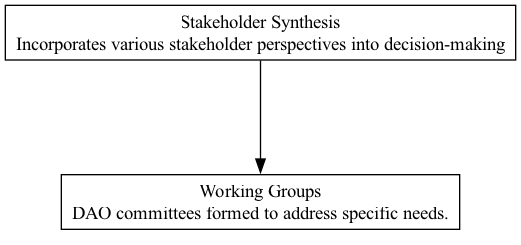Home / Contents / Donations / News / Contact
SSS - Stakeholder Synthesis

Supports:
Context:
In decentralized autonomous organizations (DAOs), decision-making is frequently distributed among various stakeholders, including token holders, developers, investors, and users. Each group may have distinct perspectives and interests, which can lead to conflicts or fragmented decision-making processes.
Problem:
DAOs face the challenge of integrating these diverse stakeholder perspectives into a coherent decision-making process. Failure to effectively synthesize these views can lead to decisions that are not representative or fully supported by the broader community, undermining the DAO’s legitimacy and effectiveness.
Forces:
- Diversity of Opinion: Varied stakeholders often have conflicting interests and priorities.
- Need for Inclusivity: Ensuring all voices are heard and considered strengthens the legitimacy of decisions.
- Complexity in Decision-Making: Integrating diverse inputs can complicate decision-making processes.
- Risk of Fragmentation: Without effective synthesis, stakeholder groups may feel alienated, potentially leading to splinter groups or forks.
Solution:
Implement a structured “Stakeholder Synthesis” pattern within DAOs to effectively gather, integrate, and act upon the diverse perspectives of all relevant stakeholders. This involves:
- Multi-angle Review: Regularly solicit and aggregate feedback from all stakeholder groups through forums, surveys, and direct consultations.
- Dedicated Synthesis Teams: Establish teams specifically responsible for integrating this feedback into actionable insights and recommendations. These teams work closely with decision-making bodies to ensure that stakeholder views are adequately represented.
- Conflict Mediation: Develop processes to address and reconcile differences among stakeholder groups. This may include facilitated discussions, mediation sessions, and the use of decision-making frameworks that prioritize consensus.
- Feedback Loop: Ensure that stakeholders receive clear communication about how their input has influenced decisions, closing the feedback loop and reinforcing their value to the organization.
Real-World Examples:
- The MakerDAO Governance Framework: Integrates a wide range of stakeholder inputs from both MKR token holders and the broader ecosystem participants, utilizing forums and governance polls to synthesize these perspectives into executive votes.
- Aragon Court: A decentralized arbitration system that resolves disputes arising in the course of DAO operations, effectively mediating between conflicting stakeholder perspectives.
Therefore:
Adopt the Stakeholder Synthesis pattern to ensure that decisions within the DAO are comprehensively informed, widely supported, and effectively implemented, boosting the DAO’s legitimacy and operational success.
